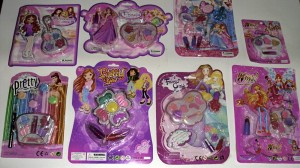
TOXIC BLUSH-ON The environment watchdog EcoWaste Coalition warns Christmas bargain hunters against these toy makeup kits that are sold cheap in local markets. EcoWaste Coalition
The recent Miss Universe pageant may inspire little girls to play beauty queen and use toy cosmetics, but an environmental watchdog on Sunday warned against giving them these gifts for Christmas.
The EcoWaste Coalition identified at least two brands of toy makeup sets—“Fashion Girls” and “Pretty Girl”—after sampling 10 items being sold cheap for P10 to P50 each in Divisoria, Manila.
“Our investigation shows that some play make-up sets are not safe to play with due to the presence of mercury that can damage the kidneys (if ingested), reduce skin’s resistance to bacterial and fungal infections, as well as cause skin discoloration, rashes and scarring,” Aileen Lucero of the EcoWaste’s Project Protect campaign said in a statement.
“Girls, in particular, are unknowingly exposing themselves to mercury and other toxic metals when they play actress, princess or Miss Universe and apply unsafe cosmetics on their faces and lips,” she added.
Traces of mercury were detected in 8 of the 10 samples in the range of 3.7 to 554 parts per million (ppm), exceeding the government’s “allowable limit” of 1 ppm for cosmetics.
EcoWaste said its tests detected 554 ppm and 198 ppm of mercury in “Pretty Girl” lipstick and blush-on powder while “Fashion Girls” make-up set showed a level of 179 ppm.
Based on the X-Ray Fluorescence (XRF) screening results, EcoWaste warned the public against buying the following items:
Pretty Girl Beautiful Colors, P40, with 554 ppm mercury
Fashion Girls Make-Up Set, P30, with 179 ppm mercury
Wink Club Beauty Series (small), P10, with 4.4 ppm mercury
Beauty Princess Make-Up Set, P30, with 4.2 ppm mercury
Pretty Girl, P30, with 4.2 ppm mercury
Wink Club Beauty Series (big), P40, with 4.1 ppm mercury
Dream Girl Make-Up Set, P50, with 3.9 ppm mercury
Dream Angel Make-Up Set, P35, with 3.7 ppm mercury
None of the eight mercury-tainted play cosmetics provided information about their manufacturers or distributors, the group also noted.
According to its website, EcoWaste Coalition is a public interest network of community, church, school, environmental and health groups pursuing sustainable solutions to waste, climate change and chemical issues facing the Philippines and the world.
The group has been waging a campaign warning consumers about toxic chemicals in various products, from ceramic ware like mugs and bowls, toys and school supplies, to cosmetics and house paints.